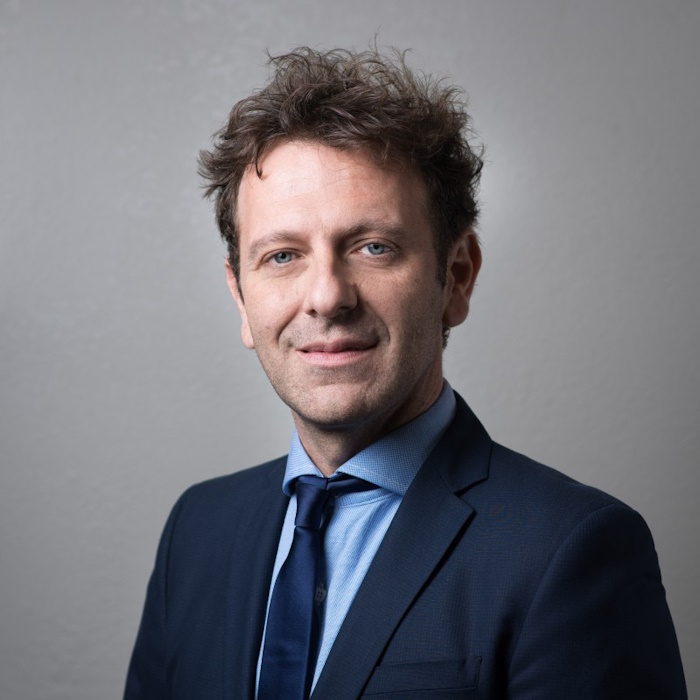Professor Vittorio Sebastiano
Vittorio Sebastiano, Ph.D. is Associate Professor in the Division of Reproductive, Stem Cell and Perinatal Biology (RSCPB) within Stanford’s Department of Obstetrics and Gynecology. He is also a Member of Bio-X, Cardiovascular Institute, Institute for Stem Cell Biology and Regenerative Medicine, Maternal & Child Health Research Institute (MCHRI), and the Wu Tsai Neurosciences Institute.
The study from the Sebastiano Lab, Monolayer platform to generate and purify primordial germ-like cells in vitro provides insights into human germline specification, describes a new, rapid, efficient platform that can generate unlimited numbers of human Primordial Germ Cells from pluripotent stem cells lines. This is an important step forward for the scalable generation of fully functional human sperm and egg cells. The quest to impact the restoration of fertility and women’s reproductive health and longevity continues.
Since 2014, Vittorio has been the Director of the Transgenic Knockout and Tumor Model Service (TKTC) at Stanford Cancer Institute, Stanford School of Medicine. Previously he was also the Director of the Human Pluripotent Stem Cells Core Facility at Stanford Institute for SCBRM, Stanford School of Medicine between 2010 and 2019 and also the Co-Director of the Ph.D. Program in Stem Cell Biology and Regenerative Medicine between 2017 and 2019.
Read Ancient viral molecules essential for human development and Blistering skin disease may be treatable with ‘therapeutic reprogramming,’ researchers say.
Read Dr. Vittorio Sebastiano is awarded the 2017 American Federation for Aging Research (AFAR) Junior Investigator Award and Does Aging Have a Reset Button?
Vittorio received his first NIH R01 grant to Dissect the Molecular Role of TBX1 in the Context of Human Pharyngeal Endoderm Development and continues to gain significant recognition for his role in the field of rejuvenation and aging.
He was invited speaker for the Cold Spring Harbor Laboratory Conference “Mechanism of Aging”; the Gordon Research Conference “Systems Aging Conference”; and the Kostas Meeting in Houston “The New Frontier of RNA Nanotherapeutics”.
In 2018, Vittorio cofounded his startup Stanford University spinout Turn Biotechnologies alongside Sergio Ruiz in 2018. Turn Bio is active in the exciting field of cell regeneration, building technology to reprogram the epigenetic clock of cells to revert any aged cell to a younger, more functional state. Its first applications focus on dermatology and ophthalmology, two growing areas of interest within the broad biotech community. Turn Bio also got him highlighted as a Top 4 Founder by LongVC. Read Turn Biotechnologies Introduces its Dermatology Platform to the European Aesthetic Community at AMWC.
His lab has established a new technology named ERA (Epigenetic Reprogramming of Aging), which repurposes the conceptual idea of reprogramming, with the goal of promoting the epigenetic rejuvenation of adult cells leaving their identity untouched. This new technology was patented and is being implemented by Turn Biotechnologies.
Vittorio earned his Ph.D. in Cell Biology from the University of Pavia in 2004 with his work on Quantitative analysis of gene expression in cloned mouse embryos. He earned his Bachelor’s Degree of Science in Biological Sciences in 2001 also from the University of Pavia.
He did his Postdoctoral training at the Max Planck Institute for Molecular Biomedicine in the Hans Schöler Lab for almost five years. He was working on reprogramming mechanisms using murine SCNT embryos. Read Oct4-Induced Pluripotency in Adult Neural Stem Cells and Pluripotent stem cells induced from adult neural stem cells by reprogramming with two factors.
He continued as Postdoctoral Fellow in the Marius Wernig Lab at Stanford University in 2009 before becoming the Research Director of the Human Pluripotent Stem Cells Core Facility and Instructor at Renee Reijo Pera Lab in 2010.
In 2014, Vittorio became Assistant Professor where he developed his long-term goals:
-
Understanding the biology of germ cells and their ability to sustain early phases of preimplantation development;
-
Understanding the mechanisms that regulate very early cell fate decisions in human embryos;
-
Understanding the biology of Pluripotent Stem Cells and the mechanisms that lead to their formation in the context of iPSCs derivation.
In 2021, Vittorio became Associate Professor where he continues his work on his goals.
In 2023, he also became Member of Dior Science’s #ReverseAging SAB, an unprecedented exploration and study of the cellular hallmarks of aging, to help slow down, stop, or even reverse its effects bringing along hundreds of researchers. He also became a Member of the Phaedon Institute SAB and of the Biomarkers of Aging Consortium SAB.
Read his Authored Chapters in Pluripotent Stem Cells: From the Bench to the Clinic and New Insights into Theriogenology. Read Transient non-integrative expression of nuclear reprogramming factors promotes multifaceted amelioration of aging in human cells and Reprogramming Cells with Vittorio Sebastiano of Turn.bio.
Watch Epigenetic Reprogramming: The Path Ahead, Cellular Reprogramming Upcoming Human Trials, and Epigenetic Reprogramming of Aging.
Visit his LinkedIn profile, Work page, Google Scholar page, and his ResearchGate profile. Follow him on Crunchbase and Twitter.
